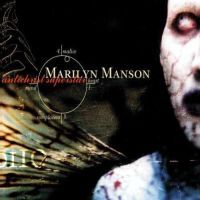
MARILYN MANSON
Antichrist Superstar
![]()
Interscope (1996)
Rating: 10/10

|
1996. Creatively thought-provoking heavy music was a rarity. When Marilyn Manson came along two years previously, the band and its namesake were generally viewed as dark-yet-campy. Save for their hit remake of Eurythmics’ ‘Sweet Dreams (Are Made Of This)’ (on October 1995 EP Smells Like Children), Manson hadn’t garnered much exposure despite touring with Trent Reznor’s Nine Inch Nails. Signed to his Nothing imprint on Interscope Records, the South Florida group convened at Reznor’s studio deep in the heart of New Orleans. It was there Manson and company experimented with drugs, sleep deprivation, debauchery, and more drugs. A then recently ordained minister in the Church Of Satan, the stage was set for the shock rocker to reveal an album so dark, twisted, disturbing, and decidedly accessible that the world had no choice but take notice.
Antichrist Superstar displays Manson’s penchant for word play. A takeoff of Andrew Lloyd Webber’s musical Jesus Christ Superstar (1971), the outing is the first in a reverse trilogy of records (September 1998’s Mechanical Animals and November 2000’s Holy Wood (In The Shadow Of The Valley Of Death). Exploring Nietzsche’s world of misanthropy, nihilism, and self-destruction, the concept is steeped in what many perceived as pure wickedness. On the surface, the album is an angst laden slab of industrial metal. At its core, however, it’s a revealing look at a childhood wrought with ridicule and dysfunction, while exploring the rise of a boy who became ‘The Worm’, eventually giving way to an obliterating angel of fatality.
Under the watchful eye of Reznor, the album is a musical masterpiece. From the rhythmic punch of lead single ‘The Beautiful People’ to the disquieting, bass driven ‘Tourniquet’, the track sequence is nearly perfect. The sinister and plodding ‘Kinderfeld’ (masturbation and toy trains, anyone?) gives way to ‘Antichrist Superstar’. Razor sharp and heavy as a really heavy thing, the apocalyptic title track creates a show stopping highlight of epic proportions. ‘Minute Of Decay’ and its low-end malice segues into the dynamic chaos of ‘The Reflecting God’. It all comes crashing down in the haunting ‘Man That You Fear’, where Manson spreads himself open, exposing the child that has become what you most dread.
Alice Cooper, KISS, and David Bowie had certainly turned things upside down. Manson took it to another level. Concerts were picketed. Parents were concerned. The Church cowered. Marilyn Manson had arrived, and the hard music landscape would never be the same.
Chad Olson





